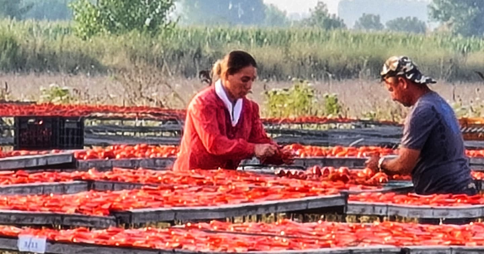
Sector: Agriculture
This case study does not arise from a conventional “problem” but rather from identifying a gap-an untapped opportunity in Albania’s agricultural sector, which in 2014–2017 was still underdeveloped in terms of modern production practices, exports, and green economy integration.
When Albania Piemonte (AL-PI) was founded in 2014, Albania’s agriculture sector was primarily characterized by traditional farming methods, limited value-added processing, and minimal engagement in international markets. At that time:
• Agricultural exports were low and mostly unstructured.
• There was little to no integration of green or sustainable practices in agriculture.
• Most local farmers and producers lacked access to modern processing technology, certification standards, and market linkages.
• The green economy was not yet a recognized part of Albania’s agricultural culture or strategy.
AL-PI initially began as a consulting and export-oriented company, but through close involvement with local producers, the founders recognized both the potential of Albania’s agricultural products and the untapped market demand-especially abroad-for high-quality, naturally grown produce.
The idea to expand into production and agro-processing emerged in 2017, when the company saw an opportunity to transform Albania’s raw agricultural potential into value-added, exportable goods. Their goal was to:
• Introduce modern and green production practices
• Support local farmers through knowledge-sharing and market access
• Promote Albanian-made agricultural products domestically and internationally
• Strengthen the economic sustainability of the rural economy
Principal beneficiaries of this implementation are rural families in the an considerable area in Albania and in particular women who work in different processes, from the first step to the last one: planting, transplanting, fertilization, harvesting, selection, processing and packaging (around 80 women).
Impact and Outcomes
The AL-PI initiative has achieved significant environmental, economic, and social impacts, demonstrating the viability of green business practices in Albania’s agricultural sector.
1. Certifications & Compliance
AL-PI is now certified with HACCP, ISO 22000, and other relevant food safety and quality standards, ensuring full compliance with EU regulations.
• The company has built a comprehensive production chain from A to Z:
o Planting, transplanting, fertilization, harvesting,
o Selection, processing, packaging, and exporting
• Each stage of the chain integrates environmentally friendly practices, ensuring minimal ecological impact while maintaining high product quality.
2. Job Creation & Local Impact
A major goal of the initiative was to create employment opportunities for local residents, particularly in rural areas.
• During the sun-drying tomato season, AL-PI employs around 80 seasonal workers, most of whom are women.
• Employment opportunities cover both fieldwork and processing activities at the drying facility.
• This job creation effort is especially impactful in a region where many people have left agriculture or emigrated abroad. AL-PI’s strategy offers a pathway for people to return to their communities through meaningful, sustainable work.
3. Environmental Commitment
AL-PI has made sustainability a core value of its operations:
• Emphasis on organic and sustainable farming methods
• Use of natural fertilizers and reduced pesticide use
• Commitment to soil health, water conservation, and biodiversity protection
This approach aligns with the principles of the green economy, which prioritizes long-term environmental stewardship and the preservation of natural capital (e.g., soil fertility, clean water, healthy ecosystems).
4. Green Economic Model
By avoiding harmful agricultural and processing practices and embracing ecological, low-impact methods, AL-PI has:
• Reduced its carbon footprint
• Lowered energy use through natural sun-drying
• Minimized waste across the supply chain
• Created a resilient and profitable green business model that supports rural development and sustainable exports
We do sustainable farming practices that supports a diverse ecosystem on the farms, so they benefit pollinators like bees, they reduce monoculture risks, and enhance soil fertility naturally.
Growing tomatoes using sustainable farming methods reduces environmental impact. Our strategy includes:
– Minimizing of pesticide use,
– Conservation of water,
– Promotion of soil health through crop rotation or organic farming,
– Reduction of carbon emissions from transportation by sourcing locally.
As company, we go for the circular economy model, where resources are continually reused, reducing the need for new raw materials and minimizing waste.
AL-PI has successfully transformed a small, passion-driven initiative into a scalable, sustainable agribusiness. It stands as a best-practice example in Albania for how environmentally responsible production can go hand-in-hand with economic growth, job creation, and community revitalization.
Cooperation in the field of recycling is a priority and focus, not just in our business. Meanwhile, we are collaborating with another Albanian entity. We have proposed a new project to them, because they also have the appropriate background in the field of meat processing. We proposed them to preserve the animal waste that originate from them and gather this material from other slaughterhouses. So, we go through a lot of steps, for coming to the end in a final product – natural fertilisants for non-residual or bio agriculture. The proposal was well-received, and we are in the final stages of product testing – a 100% natural and animal-based product, full of pure proteins. This product is being certified by the relevant institutes in the EU and will soon enter the market, bringing a strong innovation in both quality and purpose.
Transferability & Scalability
The success of the AL-PI model demonstrates that sustainable, small-to-medium scale agribusinesses can be both environmentally friendly and economically viable-making this practice highly transferable and scalable, both within Albania and beyond.
1. Transferability to Other Regions and Communities
The core elements of the AL-PI model—local sourcing, contract farming, natural processing methods, and green agricultural practices—can be easily adapted by other rural communities with access to arable land and favorable climatic conditions.
Other regions with similar agricultural potential can replicate the model using sun-drying, low-input organic farming, and short supply chains.
The model can also support return migration and rural revitalization in communities affected by depopulation.
2. Scalability Within the Agricultural Sector
AL-PI’s success shows that starting small with pilot projects—such as the initial 200 m² drying area—can provide proof of concept before expanding. This makes it feasible for micro and small enterprises to gradually scale operations.
The model can be expanded to other crops and food products, such as dried fruits, herbs, and pickled vegetables, using the same green principles.
Through strategic partnerships with farmers, access to grants, and support from agronomy experts, the model can be scaled nationally to boost Albania’s agri-food competitiveness.
3. Transferability to Other Sectors
The principles used—such as sustainable production, waste reduction, local job creation, and renewable energy use—can be applied to other sectors, including:
Textile and craft production, using natural dyes or recycled materials
Eco-tourism, by integrating sustainable hospitality and local product promotion
Green construction, through local materials and low-impact building techniques
4. Enabling Factors for Transfer and Scale
To successfully replicate or scale this model, the following enabling conditions are important:
Access to training and technical support, especially in green farming and processing methods
Availability of grants or micro-loans to invest in basic infrastructure
Supportive public policies and incentives for sustainable practices and rural development
Market access, especially through certifications (HACCP, ISO) and traceability systems that meet EU standards
